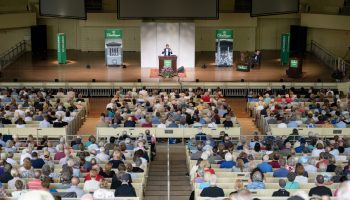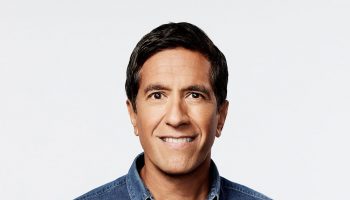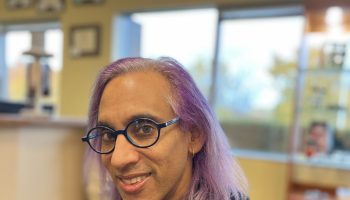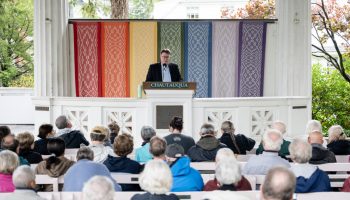“Thank you for your service.”
That’s what a majority of Americans say when they are reminded of the sacrifices soldiers make to protect our country.
“I didn’t even know what it meant,” Wes Moore said of the phrase in his January 2014 TED Talk. “I just said it because it sounded like the right thing to say to people.”
But how can the communication gap be bridged between servicemen and civilians?
Moore will talk about the reintegration of combat veterans into civilian life at 10:45 a.m. August 17 in the Amphitheater. Moore, a veteran and executive producer and host of PBS’s “Coming Back with Wes Moore,” is a frequent speaker at Chautauqua. He’s spoken on his book, The Other Wes Moore, the criminal justice system and his work as a youth advocate, but never specifically spoke on issues of war.
In his TED Talk, Moore said when he first came home after serving in Iraq, he thought if he made it back from conflict, then the dangers were all over.
“I thought if you made it back from a conflict zone, you could kind of wipe the sweat off your brow and say, ‘I’m glad I dodged that one,’ ” he said. “Without understanding that for so many people coming home, the war keeps going. It keeps playing out in all of our minds.”
Vice President and Emily and Richard Smucker Chair for Education Sherra Babcock said Chautauqua’s effort has been to keep Week Eight’s lecture theme “War and its Warriors: Contemporary Voices” authentic with a myriad of perspectives.
“We didn’t want to be pro- or anti-war; we want to focus on what war means from the perspective of those who were in it,” Babcock said. “We don’t just want to talk about how to get veterans integrated. We want to talk about what they do for our society and what they can add.”
Moore has guided the programming for this week in that direction by making connections with veteran groups and working with Babcock.
When combat veteran Andrew Burrows returned home to Jamestown, New York, after nine years of service and three combat tours, he had a few weeks of leave days to use before his medical retirement kicked in. In November 2012, he transitioned from Army pay to a pension that was about half the wage he was used to. He knew he had to support his family, but he did not know how to find a job that could work for him.
“When you’re talking about coming home, you do have issues that affect the whole family,” Babcock said.
Burrows enrolled in a resume writing class, but he felt his skills in the army were not transferable to a day job.
“I asked at Wal-Mart if I could do stock at night, because I don’t do well around a lot of people, but they only offered me a morning shift as a cashier for minimum wage,” Burrows said.
As the bills started piling up, the stress began to build. Symptoms of post-traumatic stress disorder that already existed in him began to take over. He lost his car and his house and had to take a loan from his brother.
“I didn’t know what to do,” he said. “I was an artilleryman. It’s not like I could find a job doing that.”
Two years after Burrows returned home, Chautauqua County Veterans Service Agency in Jamestown helped reclassify his disability status and find him the support he needed. Now that he’s got all his ducks in a row, he said, he can focus on his stress and he functions much better.
“Please forgive us when you transition back to a family that has been maneuvering completely without you, and now when you come back it’s not so easy to transition back to a sense of normality,” Moore said in his TED Talk.
Burrows joined the Army right after high school and said communicating with civilians in everyday life can be challenging.
“We are very gruff and rough around the edges. If it’s not about blowing stuff up, or my buddies, I don’t know what to say,” Burrows said. “But if I talk to a vet … we understand each other.”
Director of Chautauqua County Veterans Service Agency Gary Chilcott said a peer-to-peer connection can offer great support in civilian life.
“If you saved your buddy’s life, that’s a bond that lasts forever,” he said. “The dilemma today is with the vets coming back. We’re here; let us help you.”
But some do not seek help, he said.
“Life is a dark place for them,” Chilcott said. “And those are the ones we need to reach out to.”
For Burrows, walking on eggshells is not the way for civilians to treat a vet.
“We’re not these rage monsters that some people make us out to be,” he said. “It makes us feel alienated, and then we alienate ourselves, too.”
For Burrows, problems can manifest when he needs to ask for help. At the beginning of the week, his water heater broke. Instead of telling his landlord or asking around for advice, he attempted to fix it himself, which only lead to more stress and negative self-talk.
In Burrows’ experience, support groups have been beneficial, and now, he plans to run his own that focuses on spousal support for vets with PTSD.
The difference in homecomings between Burrows’ generation and veterans from the Korean and Vietnam Wars is totally different. But the audience at Moore’s lecture will be able to relate regardless of their age.
“When he’s been here before, the military part of him has not been the focus, but it’s been something people have asked about,” Babcock said. “And I’ve seen that connection he has with veterans.”





